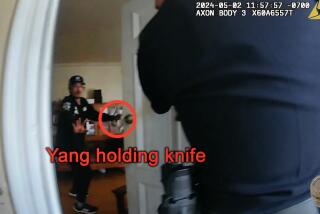Edward Yang, 59; filmmaker focused on modern Taiwanese life
- Share via
HONG KONG — Edward Yang, who won best director in 2000 at the Cannes Film Festival and was known for his realistic portrayals of modern Taiwan, has died, a film industry consultant said Sunday. He was 59.
Yang died Friday of complications from colon cancer at his home in Beverly Hills, Norman Wang told the Associated Press. Wang said Yang’s family asked him to release the information.
He was diagnosed with the disease in July 2000, shortly after receiving the honor at Cannes. He moved to Southern California in 2005 to seek additional medical treatment after the cancer spread to his liver and a lung. For the last several months, he had been doing daily drawing for a new animated film, “Fifi.”
Born in Shanghai in 1947, Yang moved with his family from mainland China to Taiwan amid civil war waged by the communists after the retreat by the ruling Nationalists, according to his biography in the book “Speaking in Images: Interviews With Contemporary Chinese Filmmakers.”
The multitalented Yang took a convoluted path to filmmaking.
Pursuing what was considered a prestigious career in Taiwan, Yang studied engineering on the island and came to the United States in the 1970s. He received a master’s degree in engineering at the University of Florida and was briefly enrolled in the USC film school before dropping out and joining his parents in Seattle, where he took a job as a computer engineer.
In an interview with Robert Sklar published in the magazine Cineaste some years ago, Yang said his interest in film was revived after he happened into a showing of Werner Herzog’s film “Aguirre: The Wrath of God.” He told Sklar that, two hours later, he came out a different person.
“It restored my sense of competence that I could be a filmmaker. This is what I thought a film should be. Film school would never teach you to make those kinds of shots,” Yang said.
Three years later, Yang gave up his job in Seattle when he was offered the opportunity to write a film for a friend in Taiwan.
He became a leading figure in Taiwan’s new wave of filmmakers. Yang favored films set in the Taiwanese capital, Taipei. His works included “That Day, on the Beach” (1983), “Taipei Story” (1985), “The Terrorizer” (1986), “A Brighter Summer Day” (1991), “A Confucian Confusion” (1994), “Mahjong” (1996) and “Yi Yi” (2000).
“Yi Yi,” which has the English title “A One and a Two,” was Yang’s most critically successful film. In addition to the best director prize at the 2000 Cannes Film Festival, it garnered awards from the New York Film Critics Circle and the Los Angeles Film Critics Assn. for best foreign language film. The National Society of Film Critics named it best picture of the year for 2000.
In reviewing “Yi Yi,” Los Angeles Times film critic Kenneth Turan wrote that, most of all, the film “deals with the conundrums of romance, the wonder and perplexity of mutual attraction, what it springs from and where it goes.”
It was the first of Yang’s works to have significant distribution in the U.S., and Turan observed that the film “was graced with the ability to see life whole, the grief hidden in happiness as well as the humor inherent in sadness.”
He is survived by his wife, concert pianist Kaili Peng; 6-year-old son, Sean; sister, Li; and brother, Robert.
More to Read
Only good movies
Get the Indie Focus newsletter, Mark Olsen's weekly guide to the world of cinema.
You may occasionally receive promotional content from the Los Angeles Times.










